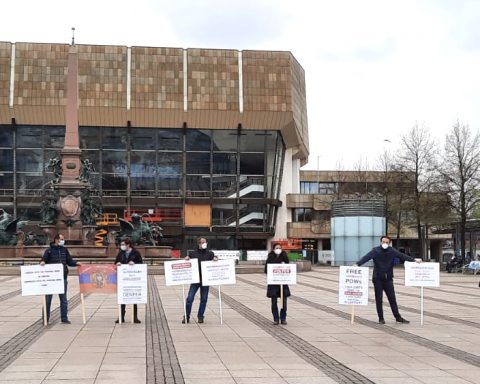Recently, The Guardian’s Rory Carroll compared Donald Trump and Hugo Chavez based on their similar rhetoric and style. Other journalists have made similar arguments. Not everyone would agree, though.
Some counter-argue that focusing on communication styles and rhetoric makes for a poor comparison. They contend that Chavez’s legacy is not his dominance of the media or his rude and unorthodox charisma. Rather, they say that it is his undoing of constitutional checks and balances along with economic policies that destroyed the Venezuelan economy. This includes price and exchange controls, expropriations, putting party loyalists instead of technocrats in key managerial positions of state owned companies, etc.
I agree that making a comparison between Trump and Chavez based on rhetoric and style misses the point. However, moving beyond rhetoric, there can be merit in this exercise. That is, if one looks at the policies that allowed Chavez – and which could allow a future Trump presidency – to increase presidential powers to implement economic policies that send the country to hell in a hand basket.
I think that, beyond the rhetoric, one should analyze the key policies advanced by both Trump and Chavez as being consistently anti-globalization.
The push for anti-globalization policies produces two interrelated effects: It allows politicians to easily sway votes; and it also shields them from the constraining structure of globally interdependent stakeholders. In turn, this allows leaders to create not dictatorships à la Pinochet, but illiberal democracies.
Here are a few related points I’d like you to consider:
1. Trump and Chavez did not pick and choose when it comes to globalization.
Most political parties – in both the developed and developing worlds, and on both sides of the political spectrum – tend to pick and choose policies regarding globalization. Parties on the right side of the political spectrum tend to forward policies that liberalize the cross-border flow of goods and services (pro-trade), but not of people (anti-immigration). Conversely, parties on the left tend to favor policies that encourage the cross-border flow of people, but not of goods and services (lefties tend to be against free trade agreements).
This is clear when you look at the policies of political parties in Germany, but it is also true of many Latin American countries. However, the policy agendas of Trump as well as Chavez are/were squarely within the anti-globalization camp on both counts; i.e. against the international flow of goods, services and people.
Trump is clearly as anti-immigration as it gets, and he is vocal against the free trade agreements signed by the Obama administration, and those before him (e.g., TPP, NAFTA, etc., as well as international political agreements such as NATO).

As for Chavez, yes, he loved talking about regional integration, but that only meant shallow international organizations whose only purpose was to mutually support illiberal democracies in the region (e.g., UNASUR, CELAC, Petrocaribe). When joining MERCOSUR (South America’s sad attempt at an EU-like common market), Chavez imposed trade barriers within the bloc (such as tariffs and the mother-of-all non-tariff trade barrier that are foreign exchange controls).
Chavez withdrew from the Andean Community because he feared increased commercial trade with Colombia would mean a sort of dumping of products into the Venezuelan economy. And there was no policy promoting the international flow of people. Foreign exchange controls had, of course, a big role to play as a barrier of people going in or out of Venezuela.
2. Anti-globalization policies are loved by illiberal democrats.
Anti-globalization policies are a great tool to win elections if a large segment of the population has been a victim of creative destruction brought by forces of global economic interdependence that inevitably change a country’s economic structure.
In both the United States and Venezuela, global economic processes have changed the industrial make-up. Over the course of the last century, low-skilled jobs have been lost in the American industrial Midwest (now called the rust belt); in the Venezuelan agricultural countryside, jobs have been lost to high-skilled service sectors in the big cities. Residents of the former industrial or agricultural towns move to the big cities in search of jobs, but they do not have the necessary skills to enter the new high-skill industries. This creates slum growth.

A large low-income electoral group emerges that is easy to sway with anti-globalization policies, because it increases in-group biases (i.e. “anti-foreign”). In-group biases are part of human nature (e.g. It’s obvious that German beer is better than Czech beer!), and they are the basis of all politics.
However, when taken to extremes, in-group biases produce a high degree of political polarization. It makes the electoral choices clear for the candidate who represents the “in-group” (i.e. Trump is the obvious choice for the stereotype of the Billy Bob Joes and Chavez the one for el pueblo, if polarization is high enough).
In turn, these voters become “cheap” in both the figurative and literal senses. Figuratively, because they can be rallied with little effort; and literally, because relatively inexpensive targeted policies of redistribution (funded by oil rents or new governmental debt, for example), can ensure their continued electoral support.
Besides winning elections, illiberal democracies seek to increase the power of the executive branch, thus undermining constitutional checks and balances. Anti-globalization policies are critical to achieve such goals.
Globalization restricts political power by increasing the number of stakeholders – meaning the participation of companies, governments, international organizations, NGOs, empowered civil societies, etc. – through ever more complex networks of interdependence. This is in part the basis of Moises Naim’s The End of Power or Dani Rodrik’s Political Trilemma of the World Economy: The more interconnected we are globally, the less room for maneuver governments have.
Let’s look at the example of globalized non-democratic countries such as China and the Asian Tigers. In these countries, constitutional checks and balances are/were non-existent. Also, for many decades, the governments in these countries suppressed almost all social, political and economic rights.
However, as these countries became more globalized and interdependent, the number of stakeholders slowly forced these governments to become more responsive to the demands of its people. This meant more empowered labor unions and civil society groups.
The power of these authoritarian governments has been constrained by globalization. The opposite is true of anti-globalization governments such as Chavez in Venezuela (or the Kirchners in Argentina, or Mugabe in Zimbabwe, or Erdogan in Turkey).
3. The danger posed by caudillo Trump runs deeper than you can perhaps imagine.
America’s political institutions are a lot stronger, and even more importantly, their domestic economy has a lot more stakeholders than Venezuela’s. This allows them to more efficiently resist the autocratic tendencies of a possible Trump presidency.
However, anti-globalization policies might allow a Trump presidency to curb freedoms (such as of the press), without changing the constitution. For example, a Patriot Act on steroids passed by a Republican-controlled Congress would do the trick of imposing restrictions on the press and other social rights.
Also, anti-globalization policies (doing away with free trade agreements or imposing non-tariff trade barriers) can reduce economic opportunities, thus reproducing poverty. It is what Chavez did in Venezuela with foreign exchange controls.
And there you have “cheap voters” who can be swayed with targeted redistribution policies funded by either debt or oil money from fracking in North Dakota.
In turn, this would strengthen in-group biases and the political support for Trump and the Republican Congress. Not to mention the fact that Trump will appoint at least one Supreme Court judge during his first term in office. With the highest court in his favor, he could push through a lot of Chavez-level crazy economic policies that sway “cheap voters” and increase executive powers. (The Supreme Court has judicial review, which allows it to enact legislation even against the will of the legislature.)
It is unlikely that Americans will be forced to stand in line for groceries, like in East Germany Venezuela. But it is conceivable that Trump will increase his executive powers at the expense of the people, not with flamboyant rhetoric, but with anti-globalization policies.










